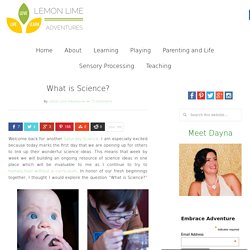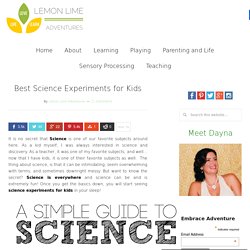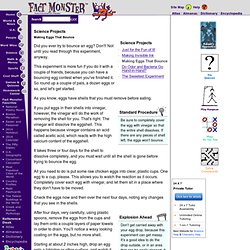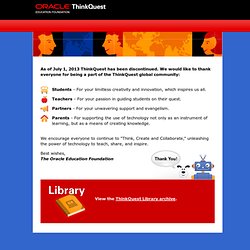

What is Science? Welcome back for another Saturday Science.

I am especially excited because today marks the first day that we are opening up for others to link up their wonderful science ideas. This means that week by week we will building an ongoing resource of science ideas in one place which will be invaluable to me as I continue to try to homeschool without a curriculum. In honor of our fresh beginnings together, I thought I would explore the question “What is Science?” {This post may contain affiliate links to materials I recommend. Anything you purchase through these links helps support Lemon Lime Adventures. I have always loved science since I was a little girl. Science is Discovery & Observation From the youngest age, children are naturally inquisitive. What Does This Look Like? * Using Senses to Explore an Object * Discussing Textures, Size, Properties * Drawing and Documenting Findings * Comparing/Contrasting Information Collected Where to Start with Discovery and Observation. Best Science Experiments for Kids.
It is no secret that Science is one of our favorite subjects around here.

As a kid myself, I was always interested in science and discovery. As a teacher, it was one of my favorite subjects, and well… now that I have kids, it is one of their favorite subjects as well. The thing about science, is that it can be intimidating, seem overwhelming with terms, and sometimes downright messy. But want to know the secret? Science is everywhere and science can be and is extremely fun! This post might contain affiliate links for your convenience. I’ve gathered together all of our science adventures from the last year to bring you a month to month guide to planning science experiments with your kids. Science is Everywhere To get started, it is important to understand the basics of what science is, and how you can find science anywhere. Finally, being set with the right planning tools will give you the confidence to try new experiments. A Year of Science Experiments for Kids January. Science Projects: Making Eggs That Bounce. Did you ever try to bounce an egg?

Don't! Not until you read through this experiment, anyway. This experiment is more fun if you do it with a couple of friends, because you can have a bouncing egg contest when you've finished it. So round up a couple of pals, a dozen eggs or so, and let's get started. As you know, eggs have shells that you must remove before eating. Standard Procedure Be sure to completely cover the egg with vinegar so that the entire shell dissolves. If you put eggs in their shells into vinegar, however, the vinegar will do the work of removing the shell for you.
It takes three or four days for the shell to dissolve completely, and you must wait until all the shell is gone before trying to bounce the egg. All you need to do is put some raw chicken eggs into clear, plastic cups. Check the eggs now and then over the next four days, noting any changes that you see in the shells. Explosion Ahead Don't get carried away with your egg drop, because this experiment can get messy.
Comets - Astronomy for Kids! Astronomy for Kids. As of July 1, 2013 ThinkQuest has been discontinued.

We would like to thank everyone for being a part of the ThinkQuest global community: Students - For your limitless creativity and innovation, which inspires us all. Teachers - For your passion in guiding students on their quest. Partners - For your unwavering support and evangelism. Parents - For supporting the use of technology not only as an instrument of learning, but as a means of creating knowledge. We encourage everyone to continue to “Think, Create and Collaborate,” unleashing the power of technology to teach, share, and inspire. Best wishes, The Oracle Education Foundation.
Lesson Ideas.